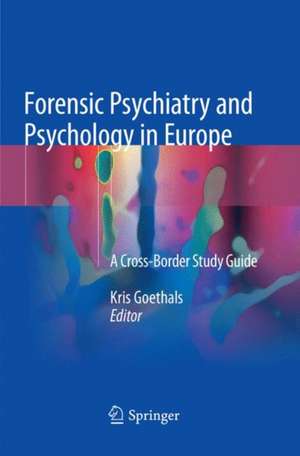Forensic Psychiatry and Psychology in Europe: A Cross-Border Study Guide
Editat de Kris Goethalsen Limba Engleză Paperback – 26 dec 2018
| Toate formatele și edițiile | Preț | Express |
|---|---|---|
| Paperback (1) | 612.47 lei 38-44 zile | |
| Springer International Publishing – 26 dec 2018 | 612.47 lei 38-44 zile | |
| Hardback (1) | 824.84 lei 3-5 săpt. | +41.02 lei 4-10 zile |
| Springer International Publishing – 12 iun 2018 | 824.84 lei 3-5 săpt. | +41.02 lei 4-10 zile |
Preț: 612.47 lei
Preț vechi: 644.70 lei
-5% Nou
Puncte Express: 919
Preț estimativ în valută:
117.21€ • 121.92$ • 96.76£
117.21€ • 121.92$ • 96.76£
Carte tipărită la comandă
Livrare economică 11-17 aprilie
Preluare comenzi: 021 569.72.76
Specificații
ISBN-13: 9783030090487
ISBN-10: 3030090485
Pagini: 351
Ilustrații: XI, 351 p. 11 illus., 6 illus. in color.
Dimensiuni: 155 x 235 mm
Greutate: 0.75 kg
Ediția:Softcover reprint of the original 1st ed. 2018
Editura: Springer International Publishing
Colecția Springer
Locul publicării:Cham, Switzerland
ISBN-10: 3030090485
Pagini: 351
Ilustrații: XI, 351 p. 11 illus., 6 illus. in color.
Dimensiuni: 155 x 235 mm
Greutate: 0.75 kg
Ediția:Softcover reprint of the original 1st ed. 2018
Editura: Springer International Publishing
Colecția Springer
Locul publicării:Cham, Switzerland
Cuprins
Part I: Legal frameworks: Adversarial versus inquisitorial legal systems.- National laws and their history.- Accountability in different European countries.- New developments in legal systems and their impact on forensic psychiatry.- The impact of the European Court of Human Rights and the European Convention for the Prevention of Torture on national forensic psychiatry.- Part II: Teaching and training: Teaching forensic psychiatry and psychology in Europe.- Specialist training in forensic psychiatry and psychology.- Impact of service organization on teaching and training.- Mapping offender-patient pathways.- Developing standards in forensic psychiatry and psychology.- Service provision by public health or justice.- Use of European professional associations.- Ethical issues. Part III: Specific skills: Challenging language barriers.- Multiagency working.- Different roles of forensic psychiatrists and psychologists: expert versus treatment?.- Teaching and training collaboration across European countries.- Recommendations to the practice of national teaching and training.- Part IV: Conclusion.
Notă biografică
Prof. Kris Goethals is a forensic psychiatrist/psychotherapist and director of the University Forensic Centre (UFC) at Antwerp University Hospital, Belgium. He is also a Professor of Forensic Psychiatry at the University of Antwerp’s Collaborative Antwerp Psychiatric Research Institute (CAPRI). Also active in private practice, he has extensive clinical experience in forensic psychiatry and psychology in Belgium and the Netherlands.
Textul de pe ultima copertă
This study guide aims to make European trainees in forensic psychiatry and psychology and young forensic psychiatrists and psychologists aware of the differences and commonalities in forensic psychiatry and psychology in different countries within Europe and to enable them to learn from the approaches adopted in each country. The guide is divided into five main sections that address legal frameworks, service provision and frameworks, mandatory skills, teaching and training in forensic psychiatry and psychology, and capita selecta. In addition, recommendations are made with respect to the practice of teaching and training across European countries. It is anticipated that the guide will provide an excellent means of improving specific skills and that, by learning about the offender/patient pathways in the different jurisdictions of Europe, the reader will gain a deeper understanding of the principles that govern methods and practices in their own work with mentally disordered offenders.
Caracteristici
Increases the reader’s awareness of differences and commonalities in forensic psychiatry and psychology across Europe Explains differences in legal frameworks and teaching and training Provides an excellent basis for improvement of specific skills
